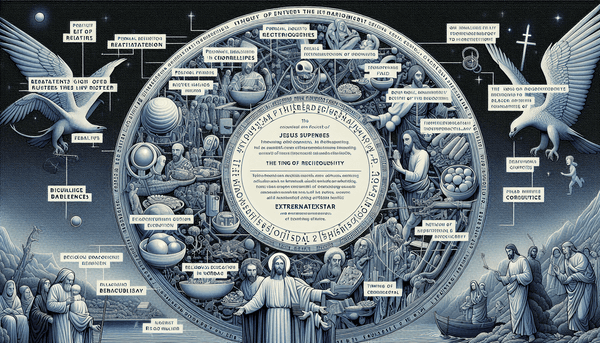Who Are the \"Real\" Jews?
The notion of who constitutes a 'real' Jew is a multifaceted one, as the term can encompass both ethnic lineage and religious conviction. In the Bible, the 'real' Jew is often understood in an ethnic context as a descendant of the Israelites, maintaining a connection to Jewish heritage. Romans 9:6-8 differentiates between being a descendant of Israel and being spiritually regarded as Israel. Revelation 2:9 addresses the issue of self-identification versus true spiritual identity. This complexity is further articulated in Romans 2:28-29, where the Apostle Paul describes a 'real' Jew as one inwardly, with circumcision being that of the heart. Adding to this, John 4:22 notes that salvation is from the Jews, which underscores the religious significance of Jewish identity in the Christian faith. The Bible also reminds us of the inclusive blessings that come through the Jewish lineage, as seen in Genesis 12:3, which promises blessings to all who bless Abraham's descendants.
The Bible’s Stance on Partiality
The Bible explicitly condemns favoritism, instructing believers to treat everyone with equal dignity and respect, regardless of their outward appearances or social standing. This principle is vividly illustrated in James 2:1-4, where Christians are admonished not to judge by external factors such as wealth or attire. This teaching is rooted in the understanding that all people are made in the image of God, as echoed in Proverbs 22:2, which states that both the rich and the poor are created by the Lord. Leviticus 19:15 further emphasizes the importance of fair judgment without partiality. The New Testament reiterates this perspective, with Acts 10:34 declaring God's impartiality, and Galatians 3:28 envisioning a community in Christ where social distinctions are transcended.
Deuteronomy 24: A Chapter on Social Justice and Compassion
Deuteronomy 24 serves as a testament to God's concern for order, justice, and the well-being of society, particularly the vulnerable. The chapter outlines fair divorce procedures, emphasizing the protection of women's rights and dignity, as stipulated in Deuteronomy 24:1-4. It also includes a compassionate law found in Deuteronomy 24:5 that exempts a newlywed man from military duty to help him establish a stable family life. Additionally, Deuteronomy 24 insists on the protection of individuals' basic needs, such as not taking essential items as collateral, highlighted in Deuteronomy 24:10-13. The overarching theme is one of a community mindful of its past and empathetic towards the needy, a sentiment echoed in the command to remember the period of slavery in Egypt (Deuteronomy 24:17-18) and the admonition not to oppress hired workers (Deuteronomy 24:14-15). For those interested in exploring the spiritual journey that reflects these values, Walking with God: A Journey of Peace and Purpose offers further insight into living a life of compassion and justice.
Moses and the Authorship of Deuteronomy
The question of who penned the Book of Deuteronomy has been one of tradition and scholarly debate. Traditionally, Moses is attributed as the author, with Deuteronomy 31:24-26 describing him completing the writing of the law. The Pentateuch frequently mentions Moses writing down the words given to him by God, as in Exodus 34:27. Numbers 33:1-2 further notes Moses recording the stages of the Israelites' journey, supporting the view of his role as a chronicler of the people's history. Despite modern scholarship suggesting multiple authors or redactors, Deuteronomy 1:1-5 introduces Moses as the lawgiver, and Jesus himself refers to Moses' writings in John 5:46-47, validating his significant contribution to the Torah.
The Envy of King Saul
The emotional turmoil of King Saul over David's ascendancy is a dramatic narrative that unfolds in the books of Samuel. Saul's envy is sparked by David's growing popularity after his victory over Goliath, as recounted in 1 Samuel 18:7-9. This envy festers into paranoia and fear of losing his kingdom, leading Saul to plot David's death, as described in 1 Samuel 19:1. Despite subsequent attempts on David's life, including a near miss with a spear in 1 Samuel 20:33, David continually evades Saul's wrath. The Psalms, some attributed to David during this time of duress, reflect the emotional landscape of a man seeking God's justice and mercy, such as in the superscription of Psalm 59.
Biblical Perspectives on Clothing
Clothing in the Bible is more than mere attire; it carries symbolic meanings of status, righteousness, and purity. The Scriptures encourage modesty and humility, calling for an emphasis on inner beauty rather than external adornment. From Adam and Eve's awareness of their nakedness in Genesis 3:7, which led them to cover themselves, to the New Testament's encouragement to clothe oneself with virtues like compassion and kindness (Colossians 3:12), clothing is a metaphor for spiritual states. The Apostle Paul exhorts believers to dress modestly, as stated in 1 Timothy 2:9-10, and 1 Peter 3:3-4 urges focus on the unfading beauty of a gentle and quiet spirit over outward appearance.
Dating Across Faiths: A Christian Perspective
When it comes to romantic relationships, the Christian faith stresses the importance of shared beliefs and values. The concept of being 'equally yoked'—found in 2 Corinthians 6:14—advises Christians to be cautious in forming partnerships with those who do not share their faith. The challenges of interfaith relationships can be manifold, affecting everything from daily decisions to long-term family planning. The Bible doesn't shy away from these difficulties, offering guidance in 1 Corinthians 7:12-16 for believers married to unbelievers. The overarching message is to seek God's wisdom and to approach relationships with a spirit of mutual respect and understanding, as exemplified by the Christ-church relationship metaphor in Ephesians 5:21-33 and the potential influence of a believing spouse outlined in 1 Peter 3:1-2.
Conclusion
Throughout the Scriptures, we are presented with a framework that challenges us to reflect upon our identities, to act justly, and to engage with others with integrity and love. From the multifaceted identity of the Jewish people to the call for impartiality and social justice, and from the complex dynamics of power and envy to the intricacies of relationships within and across faiths, the Bible provides profound insights into the human condition. As we absorb these teachings, we are invited to apply them to our lives, striving to emulate the compassion, justice, and unity that are at the core of the biblical worldview. Let these scriptural explorations inspire us to live out our faith authentically, in a manner that honors the timeless wisdom of the Bible.






